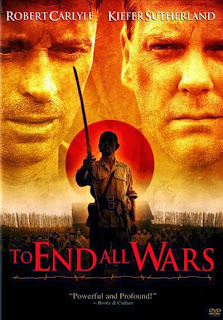As a Christian, I always enjoy a movie that features
questions about the infinite, and To End
All Wars certainly
does that. It has wonderful ingredients. A good premise, decent production values, and great music. Several very prestigious cast members
(Robert Carlyle, Kiefer Sutherland, James Cosmo and Mark Strong being the
best), do their best with less than intriguing characters.
It
goes to show that just because a movie is rated R and features brutal violence,
doesn’t mean it can’t be preachy. Immediately, after a brief, clumsy
introductory sequence narrated by Ciaran McMenamin (inexplicably casted as the
main character) we are plunged with the small band of Scottish soldiers into a
1942 Japanese POW camp. We know nothing about these soldiers, and for the rest
of the movie, we don’t learn anything else. That’s almost true. They have little to no personality, and as Mark Twain pointed out, it's hard to care about the death of a character who never lived in the first place.
Briefly, I was interested in Robert Carlyle’s conflicted Major Campbell, but he quickly morphed into a predictable character with a
foreseeable end.
After
the opening sequence, the plot for the first twenty minutes works exceedingly
well, as the soldiers begin to experience what life is like outside the
comfortable, honorbound confines of their Western Christianized culture. But
after that, it degenerates into a series of events loosely connected by the
Message. Bad thing happen. More bad thing happen. Jesus good. Me sacrifice for
brother. More bad thing happen. Of course, the film’s message is exactly right,
and hardly slips into sugar-coated prosperity Gospel theology, but because
characters are so completely allied with ideas there is nothing approaching
suspense. The good guys win, and there’s never any doubt who the good guys are.
If
we didn’t know, Ernest’s invasive voice-over certainly makes it clear. He drives
the point home every time we’re wishing we could just observe the point being
worked out before our eyes. Show, don’t tell. While occasionally offering
interesting observations, we could’ve gotten away without the voice-over.
Still,
it has its moments—I will certainly watch it again. As a piece of history, the
building of the railroad was prime material, though again, under-used. James
Cosmo might be the film’s most dynamic character, though his part is brief. Mark Strong’s
last scene was very good, though the events leading to it are predictable. I’ve got to
give him this: the director gets terrific emotional performances from the actors.
The willingness to delve into the minds not just of the Scots but the Japanese
is admirable, and lends To End All Wars
a new level of complexity and understanding that it could have maximized,
instead of borrowing much of its style from the much better Empire of the Sun and harping on the lessons it’s trying to teach. As a spiritual tale, it is far, far from the feel-good theology currently popular, and makes for a refreshing change.
Rated R for brutal war violence, torture, and some foul language.
Rated R for brutal war violence, torture, and some foul language.
Hannah Long


No comments:
Post a Comment
Warning: blogger sometimes eats comments - make sure you copy your message before you post.